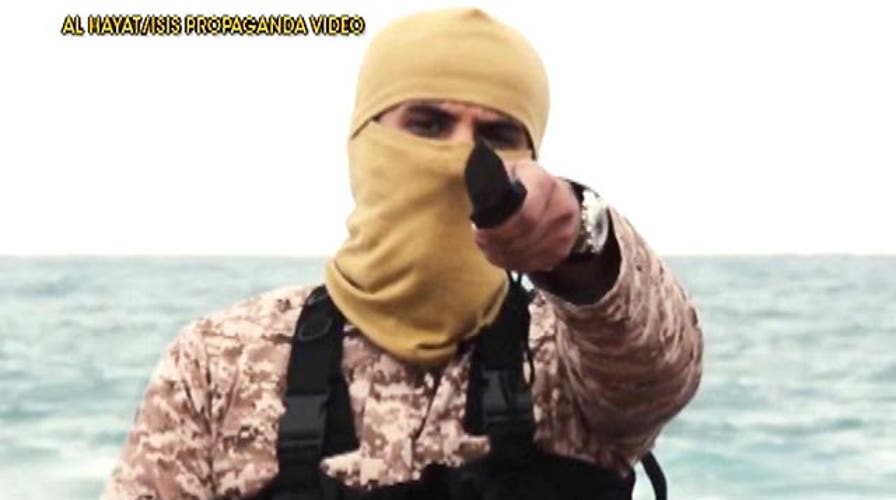A linguistics expert believes the man who threatens the West in an Islamic State video purportedly showing the beheading of 21 Coptic Christians was educated in the United States.
But Erick Thomas, a professor of acoustics and dialects at North Carolina State University, says it's unclear whether the mysterious, shrouded figure in the video released on Sunday is from the U.S.
"He clearly spent a significant amount of his childhood in the United States," Thomas told Gretchen Carlson on "The Real Story" Wednesday afternoon. "Whether it was all of his childhood or not, I couldn't say that. I would say probably from the time he began his schooling, he was in the United States, but he was properly exposed to Arabic all along."
Thomas cited the man's use of a "hard G" in two instances: when he says "chopping off" and "fighting us." He also said his pronunciation of the letter "O" in "Rome" might be a clue of his upbringing as well.
"It's a good sign of influence from another language," Thomas said.
"He clearly spent a significant amount of his childhood in the United States."
As several men in orange jumpsuits are led to a beach where they are believed to have been beheaded, one militant, dressed differently than the others, addresses the camera.
"All crusaders: safety for you will be only wishes, especially if you are fighting us all together," the militant says. "Therefore we will fight you all together," he said. "The sea you have hidden Sheikh Usama Bin Laden's body in, we swear to Allah we will mix it with your blood."
Also on Wednesday, a top Iraqi diplomat told world leaders that ISIS is harvesting the organs of its victims to fund it murderous operations, the latest charge of barbarity in a list that already includes mass beheadings, burning people alive, crucifying children and throwing people off of buildings.
The shocking new claim was presented by the Iraqi ambassador to the United Nations, who said bodies have turned up in mass graves bearing surgical incisions and missing organs such as kidneys. Ambassador Mohamed Alhakim leveled the charge as he asked the Security Council to investigate whether harvesting and selling the organs of those it executes. The claim followed an unconfirmed report late Tuesday that as many as 45 people captured by the Islamic State in the Anbar Province town of al-Baghdadi had been rounded up and burned alive.
"We have bodies," Alhakim told his international counterparts. "Come and examine them. It is clear they are missing certain parts."
Alhakim, who said a dozen doctors have been executed in Mosul for refusing to participate in organ harvesting, briefed the council on the overall situation in Iraq and accused the Islamic State group of "crimes of genocide" in targeting certain ethnic groups. The outgoing U.N. envoy to Iraq, Nikolay Mladenov, told the council that 790 people were killed in January alone by terrorism and armed conflict.
Mladenov noted the increasing number of reports and allegations that the Islamic State group is using organ harvesting as a financing method, but he said only that "it's very clear that the tactics ISIL is using expand by the day." He used an acronym for the group.
He said Iraq's most pressing goal is to win back the vast territory that the Islamic State has seized in the past year. The Sunni militants seized a third of both Iraq and neighboring Syria and imposed strict Sharia law.
"Especially worrying is the increasing number of reports of revenge attacks committed particularly against members of the Sunni community in areas liberated from ISIL control," Mladenov said.
The identities of the victims who were reportedly burned alive Tuesday in al-Baghdadi are not clear, the local police chief told the BBC. ISIS fighters reportedly captured most of the town last week.
Navy Rear Adm. John Kirby, a Pentagon spokesman, said Wednesday that U.S. authorities were aware of a video purportedly showing the executions, but that officials had not yet verified its authenticity, Fox News' Martha McCallum said on "The O'Reilly Factor."
Al-Baghdadi, which is about 50 miles northwest of Ramadi in Anbar province, is located about five miles from Ain al-Asad air base, where 400 U.S. military personnel are training Iraqi soldiers and Sunni tribesmen to take on ISIS. The base was raided last week by a small band of fighters, in what some experts believe may have been a probe in preparation for a full-scale attack.
The base has been the target of sporadic mortar fire in past weeks, and the jihadist army has been moving forces from its strongholds in Syria to Anbar Province, possibly setting the stage for a major clash with forces on the base that is now the sole bulwark between ISIS and Baghdad.
There are currently nearly 2,600 U.S. forces in Iraq, including about 450 who are training Iraqi troops at three bases across the country, including al-Asad. Forces from other coalition countries conduct the training at the fourth site, in the northern city of Irbil.
But even if ISIS militants close in on the base, taking it would require a massive force, that would present a target for airstrikes, retired Col. Thomas Lynch, a National Defense University fellow, told Fox News.
The Associated Press contributed to this report.

